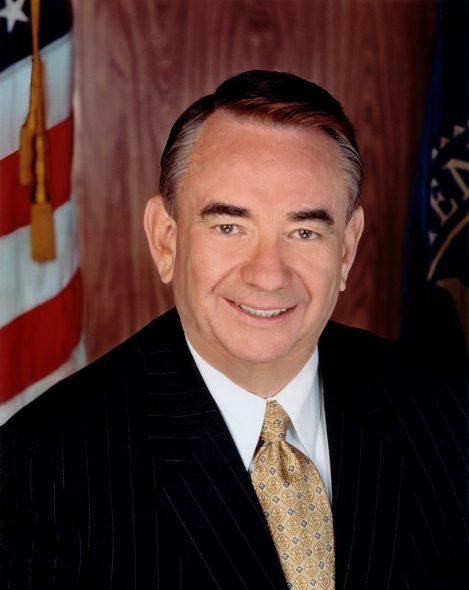How Thompson Grew State Prisons
Number of prisoners rose from 4,867 to 20,536 under Gov. Thompson. Now he wants reform.
Let’s solve a mystery: Who gave Democratic candidates for governor the idea that, with a new emphasis on rehabilitation, the number of Wisconsin prison inmates could eventually be cut in half?
Answer: Four-term Republican Gov. Tommy G. Thompson.
In his new book, Tommy: My Journey of a Lifetime, Thompson does public penance for his 14-year record of building prisons and signing tough-on-crime bills into law that lengthened inmates’ prison sentences.
One of those laws – the controversial “three strikes” bill mandating prison terms for repeat offenders – was sponsored by then-Rep. Scott Walker, now the Republican governor seeking a third term on Nov. 6.
Walker, Lt. Gov. Rebecca Kleefisch and Republican legislators have said Democrats’ proposals to reduce the prison population by half would mean setting free “vicious, dangerous” criminals. Most of eight Democrats who ran for governor this year said it would be reasonable goal.
The campaign website of Tony Evers, the Democrat challenging Walker, says this: “We have to invest in people, not prisons, to meet these challenges.”
After serving 20 years in the Assembly, Thompson served as governor from January 1987 until January 2001. When he took office, Wisconsin had 4,867 adult prison inmates; when he left office, the number was 20,536. To hold them, Thompson expanded existing prisons and built new ones in Racine, Jackson County, Prairie du Chien, Boscobel, Redgranite and New Lisbon.
He resigned as governor to become a cabinet secretary for President George W. Bush and then went on to serve to corporate boards, invest in health care and other companies and travel worldwide. He lost a 2012 run for the U.S. Senate.
Wisconsin prisons held 23,425 adult inmates on Sept. 28, according to the state Department of Corrections. By comparison, the mid-summer count in adult prisons in Minnesota, a state with similar demographics, was 9,849.
Thompson’s push to rehabilitate prison inmates is more relevant than ever, because the governor and legislators must decide next year whether to build a new adult prison and how to close two juvenile prisons and replace them with regional county-run facilities.
In the book, Thompson lays the groundwork for his goal of “reclaiming” up to half of adult inmates this way: “I didn’t have a problem then – or now – seeing tough sentences handed out to violent criminals, but our approach in the 1990s, like the trend nationally, was much more sweeping.
“Looking back, I wish we had approached it differently….I’ve come full circle.”
So, what is Thompson’s plan?
“We need to turn these prisons into education and training centers….It would pay for itself in the end, with the added benefit of being the right thing to do.
“I would have experts go in and interview the prison population and determine which inmates would make good candidates for learning and apprenticeship programs.
“Not everybody would be eligible. Don’t misunderstand me. A significant number of individuals belong in prison, period. But others – maybe as many as half – could be reclaimed and become useful members of society.
“They’re going to get out and we’re not doing enough in the meantime to prepare them.”
With Wisconsin’s unemployment rate at 2.9 percent, and worker shortages and workforce training a statewide problem, Thompson said the state’s biggest business group – Wisconsin Manufacturers and Commerce – should “buy in, helping offset the expense.”
He wrote:
“Prisoners would have to sign an agreement that they would pay back a portion of the cost of their training…It would be the equivalent of a state loan while they’re incarcerated.
“We’re giving you substance treatment and educating you. You’re going to get a job, and you owe society to pay back the cost of some of that.”
Thompson said he lobbied for his plan, with legislators and Walker aides, in 2015. “But it didn’t happen.”
In his eight years as governor, Walker has never visited a prison and recently said such visits would have “no value.”
In a self-published book critical of Walker, former Corrections Secretary Ed Wall said Walker and his aides showed no interest in the state’s prison system and refused to act on Wall’s pleas to fix problems at the state’s two juvenile prisons. Wall has endorsed Evers.
Instead, Wall says a former top Walker aide repeatedly told him: “Nothing good comes out of Corrections.”
Steven Walters is a senior producer with the nonprofit public affairs channel WisconsinEye. Contact him at stevenscotwalters@gmail.com
The State of Politics
-
A Wisconsin Political Trivia Quiz
 Dec 15th, 2025 by Steven Walters
Dec 15th, 2025 by Steven Walters
-
The Fight Over Wisconsin’s House Districts
 Dec 8th, 2025 by Steven Walters
Dec 8th, 2025 by Steven Walters
-
The Battle Over On-Line Betting
 Nov 24th, 2025 by Steven Walters
Nov 24th, 2025 by Steven Walters





















